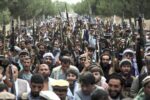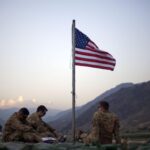Where to now Afghanistan?
In less than a week, the Taliban has captured nearly a dozen key cities in Afghanistan. With the departure of US forces, it is poised to take over the country from the embattled Afghan government. Over the past 20 years, the US has poured trillions of dollars into Afghanistan to oust the Taliban, an effort that was clearly unsuccessful. But a look at the country’s strategic geographic location and the politics of the region (including support for the Taliban) tells us that this outcome was inevitable. Afghanistan is strategically located between central and south Asia – a region rich in oil and natural gas. It has also struggled with efforts by different Afghanistan-based ethnic groups to create ancestral homelands. The Pashtun population (and to a lesser extent the Baluch population) are particularly implicated in this. For these and other reasons, Afghanistan has long faced constant meddling from the Soviet Union/Russia, UK, the US, Iran, Saudi Arabia, India and of course, Pakistan. Pakistan Afghanistan’s relationship with Pakistan has been fraught with tension ever since the former was recognised as a sovereign state in 1919. When Pakistan gained its independence in 1947, Afghanistan was the sole country to vote against its formation in the United Nations. Some of the tension emanated from Afghanistan’s refusal to recognise the Durand Line – the hastily drawn 1,600 mile border that cut across thousands of Pashtun tribes in 1893. Fearing calls from Pashtuns in both countries to create a national homeland that would cut through North Pakistan, Pakistan has long sought to turn Afghanistan into an Islamic client state – supporting an Islamic identity (over a Pashtun one) in Afghanistan to gain strategic depth against India. Pakistan helped to empower the Taliban in 1994 and has been Afghanistan’s most involved neighbour. Through its top intelligence agency the ISI, it has has bankrolled Taliban operations, recruited manpower […]










